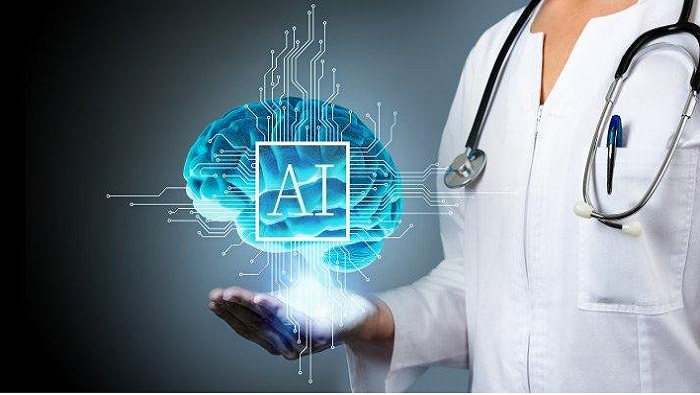The disruptive potential of artificial intelligence (AI) is rippling throughout many industries, but in one—healthcare—its influence promises to be life-changing. AI applications transform how the health industry works to save costs and enhance patient outcomes, from hospital care to clinical research, medication development, and insurance.
Artificial intelligence improves the lives of patients, physicians, and hospital managers by completing jobs usually performed by people, but in a fraction of the time and at a fraction of the expense.
The AI sector, one of the world’s fastest-growing sectors, was valued at over $600 million in 2014 and is expected to reach $150 billion by 2026.
- Early disease detection with AI
Delays can mean the difference between life and death in healthcare, so Viz.ai assists care teams in responding faster with AI-powered healthcare solutions. The company’s AI technologies can detect problems and rapidly alert care teams, allowing doctors to explore choices, make faster treatment decisions, and ultimately save lives.
- Accurate cancer diagnosis
PathAI is working on machine learning technologies to help pathologists make a more accurate diagnosis. The company’s current objectives include reducing cancer diagnostic errors and developing methods for personalized medical treatment. PathAI has collaborated with pharmaceutical companies such as Bristol-Myers Squibb and the Bill and Melinda Gates Foundation to expand its AI technology into other healthcare industries.
- AI Symptom checker
Buoy Health is a symptom and cure checker powered by AI that uses algorithms to identify and treat illness. It works like this: a chatbot listens to a patient’s symptoms and health problems, then directs the patient to the appropriate care based on its diagnosis. Harvard Medical School is just one of several hospitals and healthcare institutions that utilize Buoy’s AI to help identify and treat patients faster.
- Deep learning for actionable insights
Enlitic develops deep learning medical solutions that improve radiology diagnosis. The deep learning platform of the firm analyses unstructured medical data (radiology pictures, blood tests, EKGs, genomes, and patient medical history) to provide clinicians with superior insight into a patient’s real-time needs. Enlitic was awarded the world’s fifth smartest artificial intelligence startup by MIT, ahead of Facebook and Microsoft.
- AI IN BIOPHARMACEUTICAL DEVELOPMENT
BioXcel Therapeutics uses artificial intelligence to discover and develop novel drugs in the disciplines of immuno-oncology and neurology. Furthermore, AI is used in the company’s medication re-innovation initiative to uncover new applications for current treatments or to identify new patients. The work of BioXcel Therapeutics in AI-based medication discovery has been recognized as one of the “Most Innovative Healthcare AI Developments of 2019.”
- AI, CLOUD-BASED DIGITAL DRUG DISCOVERY
XtalPi’s ID4 platform predicts the chemical and pharmaceutical characteristics of small-molecule compounds for drug discovery and development by combining AI, the cloud, and quantum physics. Furthermore, the business claims that its crystal structure prediction technique (also known as polymorph prediction) predicts complicated chemical systems in days rather than weeks or months. Google, Tencent, and Sequoia Capital are among the company’s major investors.
- NEURAL NETWORK FOR CLINICAL TRIALS
Atomwise uses artificial intelligence to combat some of today’s most dangerous diseases, such as Ebola and multiple sclerosis. AtomNet, the company’s neural network, aids in the prediction of bioactivity and the identification of patient characteristics for clinical studies. Each day, Atomwise’s AI system evaluates between 10 and 20 million DNA molecules and claims to be 100 times quicker than traditional pharmaceutical businesses.
- DEEP LEARNING FOR TARGETED TREATMENT
BenevolentAI’s major objective is to bring the appropriate therapy to the right patients at the right time by leveraging artificial intelligence to improve target selection and reveal previously unknown insights using deep learning. BenevolentAI is collaborating with large pharmaceutical companies to license medications, as well as charity to produce readily transportable treatments for uncommon diseases.
- PERSONALIZED HEALTHCARE PLANS WITH AI
The Cleveland Clinic collaborated with IBM to integrate artificial intelligence into its IT capabilities. To improve the patient experience, the world-renowned hospital is utilizing AI to collect information from billions of administrative and health record data points. This collaboration between AI and data is assisting the Cleveland Clinic in personalizing healthcare programs on an individual basis.
- FASTER HOSPITAL VISITS, COURTESY OF AI
The Johns Hopkins Hospital has announced a collaboration with GE to increase the efficiency of patient operational flow using predictive AI techniques. A task team, aided by artificial intelligence, swiftly prioritized hospital work to benefit all patients. Since adopting the approach, the institution has witnessed a 60% increase in inpatient admissions and a 21% rise in inpatient discharges before midday, resulting in a speedier and more favorable patient experience.
—————————————————————————————————————————————————————-
Global Artificial Intelligence Summit & Awards
If you or your organization is building cutting-edge AI solutions to adapt to a world driven by technology, Please nominate yourself/or your company for GAISA AWARDS 2022.
Please follow the below-given link to nominate:https://gaisa.in/award
All further details regarding the event will be updated on the official website of Gaisa 2022. Please Visit: https://gaisa.in/

